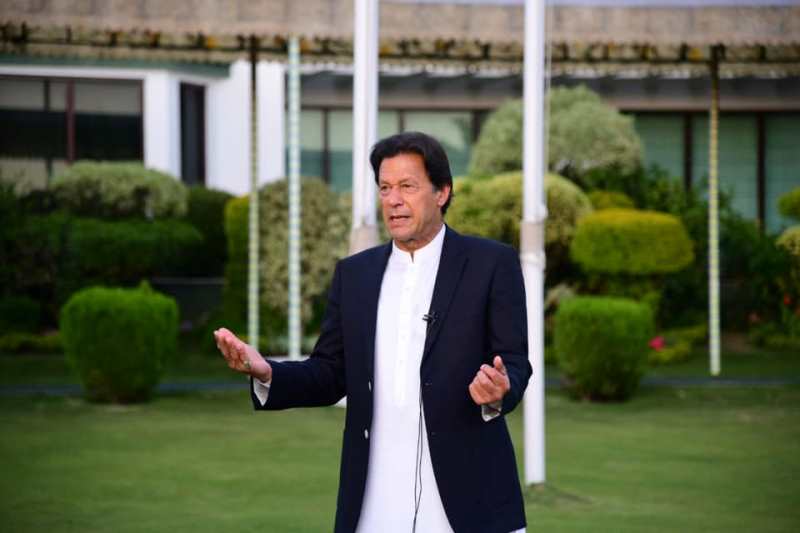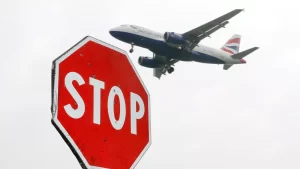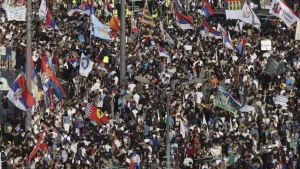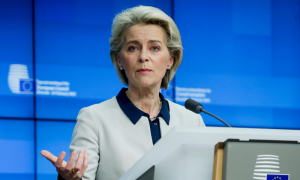PM proposes five-point agenda to end poverty, hunger

Islamabad: Prime Minister Imran Khan on Wednesday describing agriculture as “central to human survival” proposed a five-point agenda to end poverty and hunger from the world.
The prime minister in his virtual address called for investing in sustainable agriculture development, ensuring adequate and fair prices of food products, applying new technologies and rethinking patterns of food consumption and production.
“I further propose that a new strategy for sustainable food production and consumption should be considered and adopted at the Food Systems Summit next year,” Imran Khan said while addressing the inaugural session of the Governing Council of International Fund for Agricultural Development (IFAD) held in Rome, Italy.
The Prime Minister in his key-note address also spoke on the adverse effects of the COVID-19 pandemic on the economies of various countries especially the developing ones, pushing another 100 million people into extreme poverty.
He also shared with participants Pakistan’s experiences and efforts to mitigate the sufferings of poor people including the historic US S $ 8 billion relief package given by his government during the COVID-19 pandemic.
The prime minister while proposing the five-point agenda to end poverty and hunger, said firstly they ought to invest in sustainable agriculture infrastructure – for facilitating transport, production and distribution of agricultural inputs and food products. The “Green Lanes” created by China was a good example,” he added.
Secondly, he said, the governments needed to more actively ensure adequate and fair prices for agricultural and food products. The so-called “magic of the market place” should be balanced by the very visible hand of the State, he added.
The prime minister said,” We in Pakistan have suffered from market manipulations by monopolists and hoarders.”
“Farmers should not be left to the mercy of the corporations. At the same time, international agricultural trade must be rationalized. The huge agricultural subsidies provided by certain richer economies distort global markets and make it impossible for farmers in the developing countries to compete,” he remarked.
Thirdly, Imran Khan said, the new and breakthrough agricultural technologies and techniques must be consciously applied to enhance food production; ensure efficient usage of water and land; and above all improve seed quality.
IFAD and the Food and Agricultural Organization (FAO) could play a major role in that context, he added.
Fourthly, the prime minister said the adoption of digital technologies was as vital in agriculture as in other economic sectors. Ensuring internet and broadband access to the rural areas would be vital for their integration into national and global supply chains, he added.
“Fifth, and perhaps the most important, we must re-think our patterns of food consumption and production. We can eat better and many of us would do well to eat less. We can produce food with greater respect for Nature. We can stop the pollution of our lakes, rivers and oceans. We can produce more with less water, and without dangerous chemicals,” he maintained.
Imran Khan said as the world was confronting a looming agricultural crisis, the global population would soon reach eight billion people. “Six hundred million suffer from hunger. Over 100 million children are stunted due to under nourishment,” he mentioned.
Unfortunately, the COVID-19 pandemic was likely to push another 100 million people into extreme poverty, the prime minister said, adding over 20 countries were “food insecure”.
He said, “The World Food Programme has warned of the danger of famine in some of the poorest countries and conflict zones.” .
The world was facing multiple challenges in recovering from the pandemic and achieving vital first two Sustainable Development Goals, including “No Poverty” and “Zero Hunger”, he added.
Imran Khan mentioned various challenges faced by the world, including lack of financing; shortage of investment; trade distortions; unsustainable production and consumption patterns; degradation of agricultural lands and forests; impending water crisis; loss of bio-diversity; and polluted rivers and oceans. “We need a revolution in our vision of our future,” he stressed.
The prime minister said the COVID-19 pandemic and the climate crisis should drive home the message to all – the rich and the poor, weak or powerful – that their destinies were intertwined.
“We will perish or survive together. The concepts of geo-strategic adversaries; of regional or global domination; of the political advantages of foreign intervention and occupation and the oppression of peoples, are outdated and will soon be seen as irrelevant,” he remarked.
The prime minister urged the need of having a common plan and strategy for global recovery, and survival and prosperity of all humanity.
Imran Khan recalled that in response to the recession triggered by the COVID-19 crisis, he proposed a “Global Initiative on Debt Relief” last April and said the debt suspension announced by the G-20 and the emergency lending programmes of the World Bank, IMF (International Monetary Fund) and others had provided some breathing space.
But according to the latest estimates, the developing countries needed 4.3 trillion dollars to recover from the pandemic and achieve the Sustainable Development Goals (SDGs), he added.
The prime minister further recalled that last December, at the Special Session of the UN General Assembly, he proposed several measures for generation of early financing to enable the developing countries recover from the COVID-19 crisis.
The steps included comprehensive debt relief and restructuring; creation of 500 billion dollars in Special Drawing Rights (SDRs); larger concessional financing; and measures to halt and recover illicit financial flows from the developing countries to haven destinations and to richer countries, he mentioned.
Imran Khan told the Governing Council of IFAD that his government had integrated the SDGs into its national development plan and accorded the highest priority to achieve SDG-1 (No Poverty) and SDG-2 (Zero Hunger).
He said despite financial difficulties, during the COVID-19 pandemic, his government provided a relief package of around 8 billion dollars. “It included emergency cash assistance to the poorest families and other vulnerable groups, including women and children.
“We did so through our Ehsaas programme, which means compassion, fully utilizing digital technologies and data bases. This was the largest poverty alleviation programme in Pakistan’s history,” he added.
The prime minister said the agriculture sector, that had to grapple with the twin challenges of COVID-19 and locust attacks which they were subjected to last year, but it continued to have his utmost attention.
“Budgetary allocation has been increased almost three times. Growth target for the current year has been set at 3.5 percent,” he added.
The prime minister said his government was also engaged in one of the largest reforestation programmes in the world.
“We plan to plant 10 billion trees over the next 3 years. We will also set aside eight large areas as national reserves or national parks,” he added.
Imran Khan said under the China-Pakistan Economic Corridor (CPEC), agricultural modernization had been included as a vital element of the development strategy. “This will move us significantly towards combating hunger and poverty.”
He said the national efforts of developing countries like Pakistan, to promote sustainable development, and eliminate poverty and hunger, could only succeed through international cooperation.
“We desire such cooperation with all countries. We greatly admire the role played by IFAD in promoting such cooperation,” he added.
The prime minister acknowledged significant contribution made by IFAD to enhancing agricultural production in the developing countries and wished all the success in the important deliberations of current session.
IFAD President Gilbert F Houngbo, President of Angola Joao Manuel Goncalves Lourenco and Minister for Foreign Affairs and International Cooperation of Italy Luigi Di Maio also addressed the inaugural ceremony of the two-day (February 17-18) 44th session of the Governing Council of IFAD.





